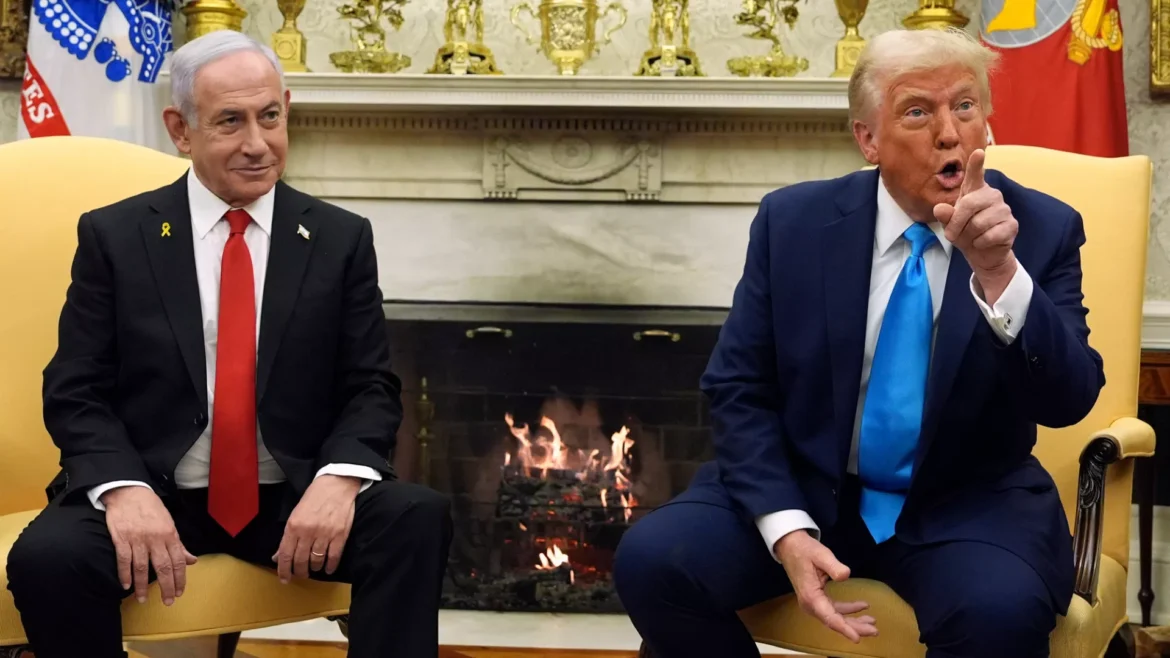In an unprecedented and alarming announcement, US President Donald Trump has unveiled plans to “take over the Gaza Strip,” a statement that has sent shockwaves through Arab American communities. While the rhetoric was met with outrage, it reflects a deepening concern over the future of Palestinian residents and the broader Middle East peace process.
During a press conference with Israeli Prime Minister Benjamin Netanyahu, Trump revealed his intention to forcibly displace Gaza’s 2 million residents as part of an aggressive plan to reshape the region’s geopolitical landscape. The President’s remarks are drawing intense criticism from those who once viewed him as a potential peacemaker.
Faye Nemar and Albert Abbas, influential Lebanese American business leaders and founders of the MENA American Chamber of Commerce, were among the few Arab Americans who had previously expressed optimism toward Trump’s policies. In a meeting with the President just months ago, they found his approach to Middle East peace promising. However, the recent developments have left them—and many others—deeply disillusioned.
Nemar’s response to Trump’s new stance was direct, reminding him of their previous encounter and the promises he made. In a letter shared with Euronews, she warned that his latest remarks veered dangerously close to endorsing what she described as the “ethnic cleansing of Palestinians,” contrasting sharply with the “sincere” peace promises made earlier.
Dr. Burhan Ghanayem, a Palestinian American activist and co-founder of the Arab American Democratic Caucus in North Carolina, voiced his frustration bluntly: “Our community is in disarray.” He noted that while many are not surprised by Trump’s stance, given his history of controversial policies, the gravity of the situation is overwhelming for those directly impacted.
Trump’s rhetoric is reminiscent of earlier actions during his administration, such as his 2016 promise to ban Muslims from entering the US, his relocation of the US embassy to Jerusalem, and his recognition of Israeli territorial claims over the Golan Heights. In March 2024, Jared Kushner, Trump’s former Middle East envoy, echoed similar proposals to relocate Gazan residents for “cleanup,” describing the region’s waterfront properties as potentially valuable.
For many, including Egyptian-American human rights advocate Nancy Okail, Trump’s approach to the Middle East appears driven by a business mindset rather than diplomatic peace efforts. She suggests that Trump views the region as a “real estate deal” waiting to be capitalized on.
Despite these increasingly alarming positions, some Arab Americans, like Nemar and Abbas, have not completely turned their backs on Trump. They express hope that his new administration will engage more with their community. Still, the general sentiment is one of growing skepticism as Arab Americans, regardless of their political affiliation, begin to question where their interests truly lie.
The election of Trump for a second term has raised questions about the future of US foreign policy in the Middle East, especially given the recent collapse of Democratic support within Arab American communities. In the wake of Biden’s administration’s support for Israel’s military actions in Gaza and Lebanon, many voters from these communities feel disillusioned and abandoned by both major political parties.
As tensions continue to rise, the future of Gaza remains uncertain, and with it, the role that the United States will play in one of the world’s most enduring conflicts. With the announcement of these new policies, the ramifications for both the region and Arab American voters are yet to unfold.
Stay ahead with the latest news on global innovation, leadership, entrepreneurship, business, and tech. Join us on WhatsApp or Telegram for real-time updates. Have a report or article? Send it to report@theinnovationtimes.com. Follow us on X (Twitter), Instagram, LinkedIn, YouTube, Pinterest, and Facebook for more insights and trends.



